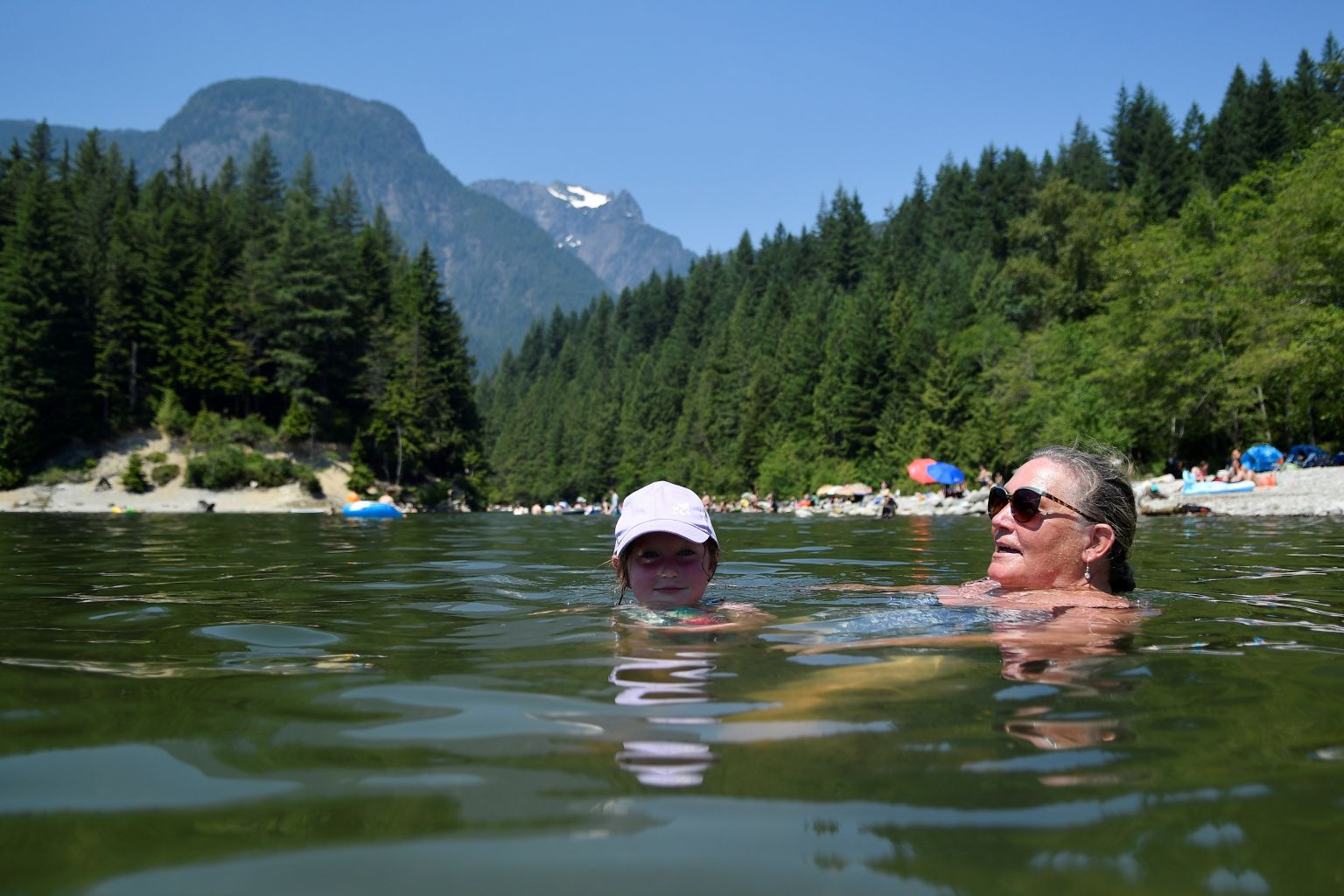Record heatwave in US and Canada kills 45 in one Oregon county
Sign up now: Get ST's newsletters delivered to your inbox

Kim Cullen and her granddaughter Ella cool off in Alouette Lake, in Maple Ridge, British Columbia, on June 28, 2021.
PHOTO: REUTERS
VANCOUVER/PORTLAND (REUTERS) - A heatwave that has scorched much of western Canada and the US Northwest has killed at least 45 people in Oregon's Multnomah County and is seen as the cause behind an unusual surge of deaths in British Columbia, officials said on Wednesday (June 30).
The heat dome, a weather phenomenon trapping heat and blocking other weather systems from moving in, smashed record high temperatures in the US Northwest and western Canada in recent days.
In Multnomah County, which includes Portland, 45 deaths since Friday have been related to the excessive heat, the county medical examiner said in a statement, citing hyperthermia as the preliminary cause.
Oregon had only 12 deaths from hyperthermia from 2017 to 2019, the statement said.
In British Columbia, there were 486 sudden and unexpected deaths between Friday and Tuesday, about 320 more than the average for a five-day period, the BC Coroners Service said.
Lytton, a town in central British Columbia, this week broke Canada's all-time hottest temperature record three times. It stands at 49.6 deg C as of Tuesday. The previous high in Canada, known for brutally cold winters, was 45 deg C, set in Saskatchewan in 1937.
In the US Northwest, temperatures in Washington and Oregon soared well above 40 deg C over the weekend.
Portland, Oregon set all-time highs several days in a row including 47 deg C on Sunday.
The heat dome, a weather phenomenon trapping heat and blocking other weather systems from moving in, weakened as it moved east, but was still intense enough to set records from Alberta to Manitoba, said David Phillips, senior climatologist at Environment and Climate Change Canada, a government agency.
"In some of these places, their records are being annihilated," Phillips said.
"It really is spectacular, unprecedented for us."
It was unclear what triggered the dome, but climate change looks to be a contributor, given the heatwave's duration and extremes, Phillips said, also noting that it set new temperature highs a month earlier than the usual hottest time of year.
Canadian Prime Minister Justin Trudeau paused to remember the dead during remarks in Ottawa on Wednesday and expressed concern over the fire treat.
"We've been seeing more and more of this type of extreme weather event in the past years," Trudeau said.
"So realistically, we know that this heat wave won't be the last."
Oregon emergency
Oregon Governor Kate Brown declared a state of emergency due to "imminent threat of wildfires" while the US National Weather Service in Portland issued a red-flag warning for parts of the state, saying wind conditions could spread fire quickly should one start.
"Now is the time to make sure your emergency prep kit is ready to go in the case you are asked to evacuate," the weather service said.
The Portland Fire Department banned use of fireworks for the Fourth of July weekend, when Americans celebrate Independence Day.
Elderly people, along with children and the chronically ill were especially at risk, said BC's chief coroner, Lisa Lapointe. Advocates warned that migrant workers were particularly vulnerable, especially inside greenhouses.
Staff were cancelling outdoor activities to keep seniors safe, said Lee Coonfer, chief executive of the BC Seniors Living Association, which represents 175 seniors homes.
Fire and melting ice pose risks
The extreme weather poses different threats depending on the region.
Most of Alberta and large parts of British Columbia and Saskatchewan are at extreme risk of wildfires, according to Natural Resources Canada's fire weather map.
"All the ingredients are there. It's a powder keg just looking for a spark," said Mike Flannigan, professor of wildland fire at University of Alberta.
The interior of British Columbia fears thunderstorms forecast for Thursday will bring lightning, sparking forest fires.
But the Chilcotin region, roughly 600km north of Vancouver, was on flood warning due to the "unprecedented"amount of snow melting at "extraordinary" rates, according to a government release.
"These are the types of issues that are going to be confronted more and more over the next few years," said Adam Rysanek, assistant professor of environmental systems at the University of British Columbia.


